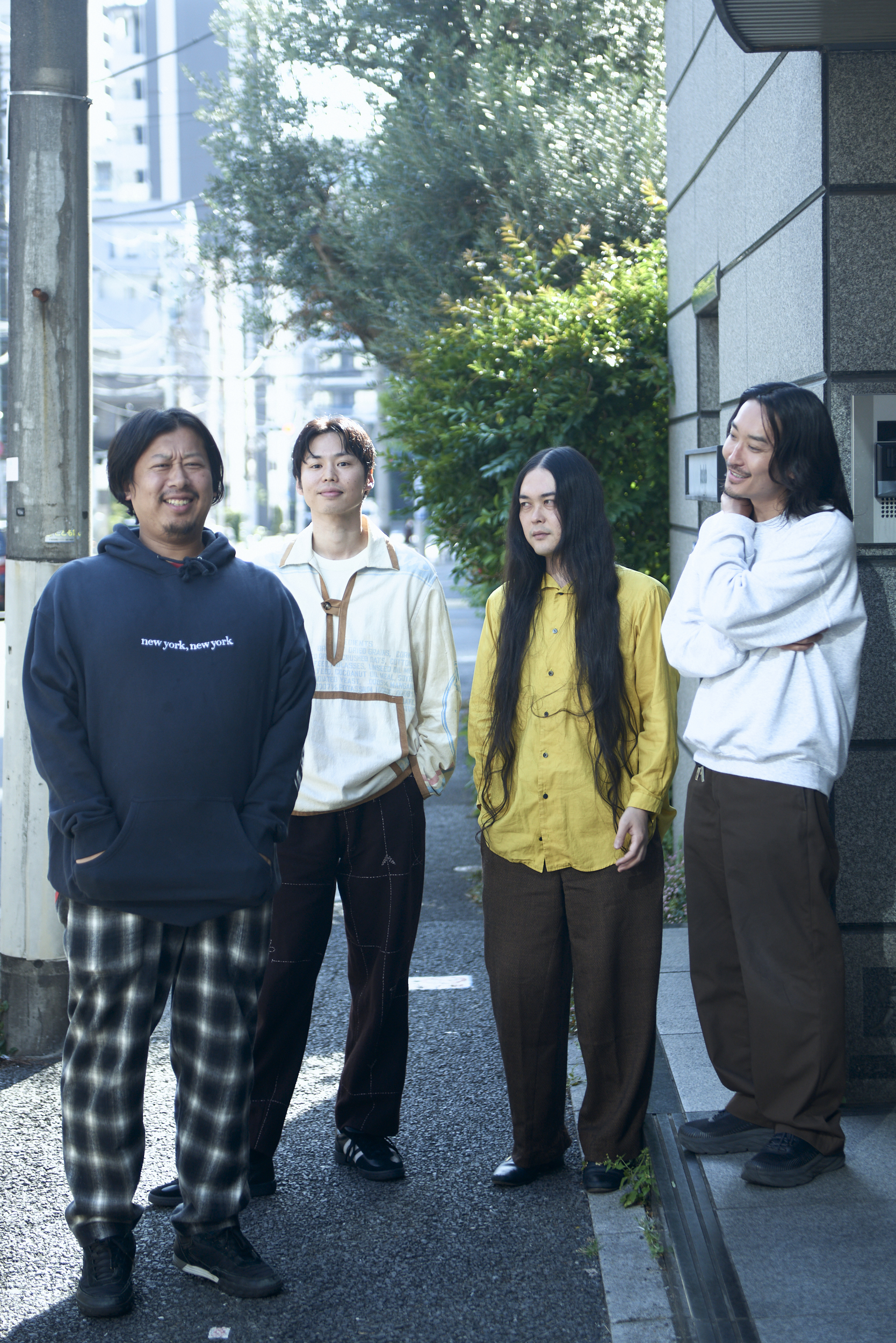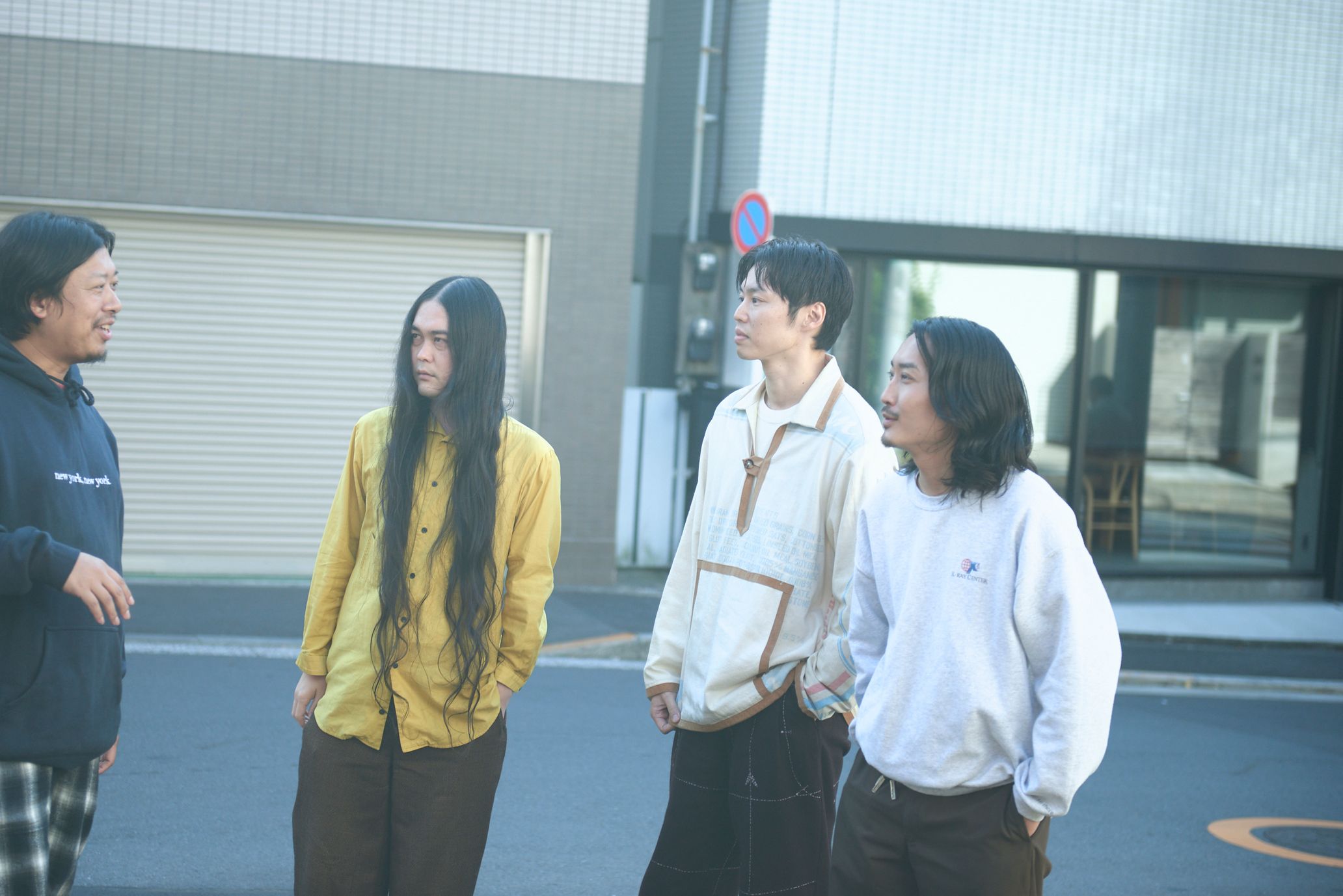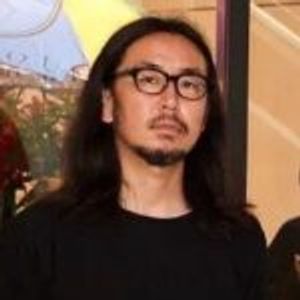
(From left to right)
Takumi Kushida
CEO of Kussy. Takumi Kushida founded Kussy in 2022 after working at Space Shower. He works on TV programs about music, online content, music videos, and other visual content.
Instagram:@kushida_takumi
Ryohei Kaneda
Art director and graphic designer. After working at groovisions, Ryohei Kaneda founded YES, a design studio, in 2019. His multidimensional career includes working on campaigns from top to bottom, branding, books, magazines, products, videos, and spaces.
Instagram:@kanedaryohei
Ten to Sen
Owner and buyer of SOKKYOU, a secondhand store in Koenji. He also runs a clothing line, Daughter, online. Ten to Sen is the founder of DENPA!!!
Instagram:@10to1000
Toshi Miyashita
The CEO of 8%, a creative studio-cum-agency that collaborates with, produces, and designs for artists, IP, music, art, spaces, and more.
Instagram : @setagayaboy
“DOME” Presented by DENPA!!!
Instagram:@dome.fest
DENPA!!!, a subcultural party that gained a cult-like following in the 2000s, came back as DOME ‘23. The party has been organized through various means in fashion, art, subcultural circles, and the club scene, such as the GEISAI stage in Taiwan hosted by contemporary artist Takashi Murakami, So Very Show by TAICOCLUB, a collaboration with MTV Japan, and so on. Ten years since their last party, DENPA!!! 2013, the first installation of DOME was held on two floors: Daikanyama UNIT and SALOON.
In accordance with their statement, “We, the DENPA!!! team, have been working across different cultures and created a new event to manifest our long-awaited childhood dream,” ∈Y∋ opened the night. The braindance genius Bogdan Raczynski, who came to Japan after 20 years, lit up the dancefloor with euphoric breakbeats and four-on-the-floor beats in pitch darkness with no lights or visuals, akin to Autechre.
Other experimental acts from abroad that performed were experimental glitch techno producer Grischa Lichtenberger and arguably the most crucial figure in China’s contemporary electronic music scene, Howie Lee. Additionally, there were domestic artists like aus, who released an album for the first time in 15 years, world’s end girlfriend, who released an album for the first time in seven years and eight months and performed live for the first time in three years and eight months, Cwondo, the solo project of No Buses’ Taisei Kondo, and BBBBBBB, who released their sophomore album from the American label, Deathbomb Arc.
The party lasted for around eight hours and was a dreamy experience that didn’t require words; I realized just how amazing it was later on.
Why did they return as DOME after ten years since their days as DENPA!!!? In the first volume, we got Ten to Sen, who founded DENPA!!!, to look back on the party’s history along with Toshi Miyashita, Ryohei Kaneda, and Takumi Kushida.
A festival-like space born in 2007
–How did DENPA!!! first come about?
Ten to Sen: I was born in 1984 and am part of what you’d call the “Kireru 17-sai” generation (translates to “the 17-year-old that snapped,” and refers to youth around 17 years old, born between 1982 to 1986, who committed violent crimes around the year 2000; those born between those years were sometimes called the Kireru 17-sai generation). It was around when I was in upper elementary, and Evangelion was on TV. Kireru 17-sai became a social phenomenon, and hope, despair, and this mood that said, “It wasn’t supposed to be this way” spread in society. Our generation spent our youth in such times. We’re all two years apart, so we grew up under similar circumstances, but two of our members lived abroad before, so I’m sure they had time to look at Japan from a bird’s eye view. Or rather, they had a place of belonging outside of Japan.
On the contrary, I always felt like I didn’t have a place to belong in Tokyo. At the time, the music I listened to was ambient, electronica, noise, breakcore, and other underground genres that weren’t known in Japanese society. It was as though the music allowed me to escape somewhere else, and it saved me. I used to frequent Warszawa Records, which used to be in Shibuya. I was also in the fashion industry and used to swing by parties and events. But most of the music they played was hit songs, and people you’d call influencers today were the DJs. I used to be at the edge of the bar counter and feel out of place. For better or worse, there was a distinct cliquey-ness, and this feeling of “This place isn’t for me” bubbled up inside me.
–It was also a time when the media was undergoing a huge change.
Ten to Sen: That’s right. It was also the dawn of this culture of getting your picture taken. When digital media gained more momentum than print media, party photos peaked, and the reason people went to parties shifted from listening to music to being about status. It was like the fact that you were there was important and worthy. This shift made me feel hopeless. Eventually, I felt this strong urge to be free from withdrawing within myself. That was the initial driving force to start DENPA!!!
Takumi Kushida: Was DENPA!!! founded by you three?
Ten to Sen: It was initially started by me, who had zero friends. When it came time to break through that locked-up feeling, I wanted to eliminate the idea of lumping things together by category or generation because I didn’t like it, like music, fashion, or whatever. I liked the culture nerds had, but I didn’t belong there either.
So, I began wanting to run countercultural events that would remove those borders through music that wasn’t widespread in society. When I organized events with such challenges in mind, artists and customers of all kinds started coming. The fact that I was an amateur at booking artists and, therefore, was a mess played a part, but as a result, the dancefloor’s consciousness expanded, creating an altered state of mind. The borders melted away, and it felt good. It was like a dream; a festival-like space was born. That infectious energy spread far and wide.
Toshi Miyashita: I happened to be in England then, and my close friend at language school was in a long-distance relationship with a Japanese girl who was an early member of DENPA!!! This might’ve only applied to my environment, but there was a lot of aggressive music, like breakcore and experimental music, in England at the time. Some parties played anime music and breakcore mashups. I had older acquaintances from the music label, 19-t, and I got into that kind of music. The girl in Japan was throwing a party where an artist called CDR was performing, and she said, “Don’t you like this artist?” I had never spoken about such music in Japan, so I said, “I want to meet the organizer when I come back to Japan.” And that organizer was Ten.
Ten to Sen: This girl I wasn’t too close with said, “There’s a person that wants to meet you, so come over to my place” (laughs).
Toshi: Back then, mixi was popular, and you could get an idea of what kind of person was in the community, so you oddly felt close to people. We met and became friends, and I started joining them after their second party as a DJ and booker.
Ten to Sen: People started getting together after I screamed over a megaphone to promote our event at the beginning of DENPA!!! when Gap still existed at the Omotesando crossing. I probably announced events on mixi too, and many people started coming to me, saying they wanted to help. Kaneda-kun shared a house with one of those people.
Ryohei Kaneda: I lived with my best friend, one of the founding members of DENPA!!! Before we started throwing parties, those who were members at the time would come over to our house. I loved WARP RECORDS and Rephlex and listened to everything they released at the time. We all became close and naturally became a family.

Leading up to 2013, when a new chapter was made
Ten to Sen: From that point onwards, we saw a steady increase in people joining us. For instance, around midway [in our history], we were approached by Space Shower TV about a project called DAX, which combined music and video. We were cast on a TV show, like a welcome party for new employees in the video broadcasting department, even though we were barely informed about the content.
Toshi: We were also on a weird episode about all of us at a cherry blossom viewing. There was a cherry blossom viewing set in the studio, and we were invited to this traditional tiered stage.
Ten to Sen: The new employee for that project was Kushida-kun. We connected because we hit it off during commercial breaks; it was like we could talk in a common language.
Kushida: I’m from the Kansai region, so I consumed a different type of breakcore from the mentioned context. Kansai Zero Sedai, whom people called the children of Boredoms, was at the top of their game. Afrirampo, Oshiripenpenz, and ZUINOSIN were regarded as the big three; they were huge. With that said, it might’ve been a movement of a total of 1,000 people, but there were so many fun events. Looking at DENPA!!! from the chaotic breeding ground of Kansai noise and breakcore, they seemed different. They looked genuinely cool to me, as though they represented an ethos I was unfamiliar with. We then started talking to one another.
Ten to Sen: Since the formation of DENPA!!! in 2007, we had our last event in 2013. Back then, Kushida-kun used to come to our events as someone who worked at Space Shower. He’d take photos and broadcast our events.
Kushida: I used to go as an AD. Sometimes, I’d shoot my older colleagues’ show. But it was fun. The audience, too.
Kaneda: I started officially helping out around the third or fourth event. I helped out occasionally and started making flyers on my own. We lived in a house, so everyone would hang out every day. People would go home during the day and return to ours at night… they were basically at our place eight times a week.
Ten to Sen: We never got together to strategize or discuss details.
Everyone: We didn’t.
Ten to Sen: We had events bi-monthly in 2007 and began to have them regularly by 2009. In my head, 2010 marked the end of one chapter. I thought I was done, but someone posted online without my knowledge there would be another party in 2011. I found out while sitting on a massage chair at a public bathhouse (laughs). But I became infected and driven by the members’ desire to hold a party and was drawn to that sort of power.
(Continued in Vol. 2)
Photography Masashi Ura

